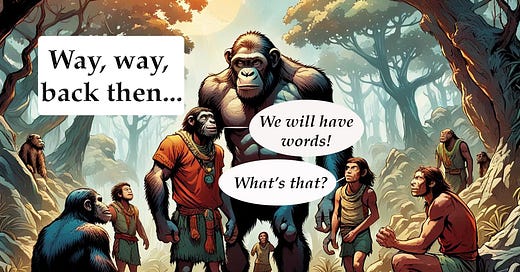The traditionalist in me loves a good argument that is wordy, witty and pithy. Well, what do you want from someone who is in love with her Thesaurus? Having such a love affair means the words you use won’t be worn out, and over used. The same words and phrases used over and over lose their impact.
There was a time, back in the day when we were Chimps, that we didn’t have words with meaning. In fact, we didn’t have words! But we did have communicative sounds. Just as Chimps do today. But then we were zapped by that divine spark, say some 500,000 years back, and we began to assign meaning to the sounds we made.
This is also that era in which several sorts of humans made their appearance. I theorize that at that time, the first war of the words began. Furthermore, and, again I theorize, the homo sapiens won the war because we were better talkers. Why that is so we will never know. Perhaps because we invented grammar? Words + grammar = language.
With the growth of language came the growth of organized ways of living. And before long, we had Greeks giving those fantastic speeches with men like Demosthenes standing on the beach carrying on an argument with the ocean waves. A few thousand years later, we talk to one another even though we are thousands of miles away. Language has become so precise that I can get artificial intelligence to make an image for me just by giving it a few words.
Politics entered the game of organized living early on. People wanted rules to live by if they were going to live together. During the Hunter-gatherer phase, they had simple rules. These would be more like conventions, habits, necessary to keep the group together and surviving. It is an all hands on deck lifestyle, each doing their part as needed. Layabouts were rare. They still are in those tribes that remain Hunter-gatherers.
Politics, in civilized cultures, is a way to organize society so that folks can be more productive. Later on, laws were written, and then codified through precise language. This is when society began to be complicated. Basically, laws were written to keep individuals from hurting other individuals. A part of laws, and enforcers, is to keep feuds, or private wars, from developing. As wealth grew, a certain ilk of individuals muscled their way into positions of power. In the beginning, these leaders were nice as they provided structure. And then, before long, they were not so nice.
The thing about the leader class, and why they are not so nice, is that they are willing to do things other people aren’t.
As civilizations grew, the more complex they became. Thus language needed more words. In our current world, we find words morphing or they are replaced. For example, automobiles became cars, and furnaces are now heaters. Computers morphed into laptops or desktops.
The words we use in our social and political discourses also have altered. Depending on where you stand in the scheme of things, the new uses of words either illuminate issues, or confuse them. Sometimes the words we use no longer suffice to clearly state a subject or problem. Things have gotten muddy. Especially when words are used in platitudes, which we find much too often on social media.
Let’s look at some of these words we are now inundated with. I’ll suggest a few alternates. Because different words will frame the argument a bit differently.
The first word is that one we hear about when abortion becomes the topic: choice. A woman must have a choice, the pontificators say. However, choice invokes decision making. Because to choose one has to decide what to choose. That makes the person choosing, the decision maker in charge of their life. Perhaps a better way to discuss abortion is to start from the premise of, “My body, my decision.” The extension is then, “I will decide what to do with my life.” Now that is open to a more disturbing question. “What is your decision concerning your pregnancy?” The conversation now becomes centered on the agency of the woman, not on a silly platitude, “My body, my choice.”Instead it is now, “My body my decision.” Or, “My body, my responsibility,” opens it up to more questions and discussions. What many women insist on, whether they recognize it or not, is a woman gets to own her decision.
Another word we now come across frequently is, “anti-Semitic.” Personally, I don’t like the word. It is cold and clinical, plus overused. It doesn’t have the impact it once had. Plus, technically, it is all wrong. Semite is now used to describe a language group that includes Arabic, Aramaic and Hebrew. The authentic way to refer to those who hate Jews is simply stating that as a fact: Jew-hatred. There are many people who have Jew-hatred. There is nothing that needs explaining in that term.
Let’s take on the Marxist, communist, socialist, leftist word group. Like anti-Semitic, these words have been overused. Which means they have lost their impact. Aside from that, if a person is a Marxist, calling that individual such doesn’t disturb them one bit. Of course when someone on the right, during an election, refers to someone on the left as a communist, especially someone running for office, their purpose is to warn the undecided voter. However, using those words fails to impress because they have heard it too many times.
What words are good alternatives that describe Marxists? Commies are controllers. They are self-righteous. Bigoted when it comes to religion. Criminal when it comes to the people they are supposed to care for. Liars when they want the voters to vote for them. Thieves when it comes to taxes. Too many politicians are cronies of the ruling rich, and predators of the vulnerable. The left needs to be called not the “hard” left but the sour left, or just plain, humorless. Because they truly are insufferable.
After Kamala Harris said she would shoot a home intruder, she tried to back track. Funny, that, because it was the one statement she made that traditionalists, libertarians and Republicans can agree with. Was it a lie? Well, Mr. Trump won’t debate again, but I sure wanted him to ask her if she meant what she said. And, does she think all Americans have the same right as she does to own a gun and shoot an intruder? (I don’t think a moderator would ask that question.) Now here is what I call a “me too” moment for the right side. “Me too, Kamala, I will shoot the intruder!” Or, “I'm with you, Kamala, shooting those intruders!” Or this, “Backtracking Kamala, did she tell a lie?”
Some other changes I have made to my own vocabulary when it comes to the insanity we are subjected to are the following:
homeless - Street people, freely insane, professional victims, wandering criminals, addicts on the loose.
people who work with the street people - victim minders, enablers,
the woke - snobs, smuggers, bullies, sourpusses, preachy
I admit to having much affection for the word, sourpuss. After all, people who are self-righteous are rarely happy, or fun to be with. As Abbie Hoffman once said, “Never trust anyone who doesn’t have a sense of humor.” Too bad his followers didn't get the memo.





